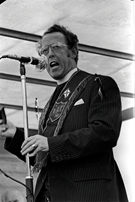The MP notes
NIO officials kept tabs on the backgrounds, political and personal views of the region’s 12 MPs. The files for those now deceased are released in the new year public records. Peter Cheney reports.
One civil servant, AE Huckle, found SDLP leader Gerry Fitt in “his normal ebullient and anecdotal service” on a flight back from London on 24 June 1979. A frank conversation followed.
Ian Paisley, in Fitt’s view, had “no element of statesmanship in his character at all”. In any power-sharing government, the SDLP would need “some sort of veto to protect themselves against Paisley’s naked sectarianism.”
Any move towards a united Ireland would result in a “savage Loyalist backlash” and a “Paisley-led UDI” i.e. a unilateral declaration of independence, as happened in Rhodesia in 1965. This would be “broken eventually by US intervention” although the exact meaning of that is unclear.
Fitt claimed to be the “only moderating influence” within the SDLP, a party which combined urban Catholic socialism with rural “nationalism and green Toryism”. However, Fitt was “growing tired” and saw the end of his political career approaching.
He had “seriously considered resignation” in a dispute over the selection of Austin Currie for Fermanagh and South Tyrone but “would only retire when he saw absolutely no hope of inter-sectarian co-operation in an agreed form of government in NI.”
The note continues: “If he did go, the SDLP would go totally green, and would split, with some of the moderates refusing to follow the leadership of Hume and Mallon.” Fitt also asked the NIO to keep Austin Currie’s name in mind “whenever we were thinking of paid appointments to quangos.”
Another note shows the respect in which Fitt was held. “A courageous man, he has been the most outspoken of SDLP politicians in denouncing IRA violence,” it reads.
However, his leadership was “largely titular, many of his colleagues considering him a bit of a buffoon.” Gerry Fitt lost the leadership to John Hume in November 1979 and subsequently left the SDLP. He died in August 2005.
Robert Bradford addresses Black Saturday in Ballygowan, August 1980.
South Belfast MP Robert Bradford stood out for his extremism. “Outwardly a soften spoken, polite man of the cloth, he nevertheless combines biblical dogma with political flexibility,” the note states, although it gives little evidence of that flexibility.
“He is perhaps the keenest upholder of Ulster morality,” it adds, before describing its subject as a consistent “Taig-basher” who “tends always to be at the core of controversy but not quite at the centre of political events.” He took a “particularly strong line against Poleglass” and believed the British were distantly related to Old Testament Israel.
The MP’s allegations of benefit fraud on the Falls Road and security risks at the Royal Victoria Hospital “fell totally flat”. Robert Bradford was murdered by the IRA in November 1981.
Party colleague Roy Bradford was the polar opposite. He was not an MP at the time but a note was made before he met the Secretary of State for dinner. This Bradford received a glowing reference as “academically brilliant and a fluent speaker” who has “never really been in the traditional mould of unionism.” He died in 1998.
John Dunlop was MP for Mid-Ulster from 1974-1983, and seemed to fit the NIO stereotype of a rural unionist. Standing on “fundamental Protestant positions”, he was “rarely compelling” in discussions and “generally muddled” as a public speaker.
“Essentially a man of blacks and whites, he rarely contributes to subjects beyond constituency issues which he defends with parish pump fervour,” his biographer adds. Dunlop passed away in 1996. In hindsight, he would probably have seen the second comment as a compliment.
Fermanagh and South Tyrone independent Frank Maguire could not have been more different from his neighbour. A publican, he played and refereed in Gaelic football and was once an IRA internee. Despite that background, he was on good terms with NIO ministers and was known as a “genial, hospitable character with a great sense of humour”.
Maguire was “a retiring politician, who harbours a suspicion of the press” and “lacks any political sophistication”. Appearances at Westminster were rare, indicating his “almost total indifference to matters outside the North, which can also be said to extend to matters outside his own constituency”.
He rarely visited Belfast either. As for constituency work, his telephone was “almost never off the hook”, often with calls to Stormont Castle “though he very rarely puts pen to paper”. Frank Maguire’s death in March 1981 prompted the by-election which was won by Bobby Sands.
| Constituency | Name | Party |
| Antrim North | Ian Paisley | DUP |
| Antrim South | James Molyneaux | UUP |
| Armagh | Harold McCusker | UUP |
| Belfast East | Peter Robinson | DUP |
| Belfast North | John McQuade | DUP |
| Belfast South | Robert Bradford | UUP |
| Belfast West | Gerry Fitt | Independent |
| Fermanagh and South Tyrone | Frank Maguire | Independent |
| Londonderry | William Ross | UUP |
| Mid Ulster | John Dunlop | UUUP* |
| North Down | James Kilfedder | UPUP** |
| South Down | Enoch Powell | UUP |
* United Ulster Unionist Party ** Ulster Popular Unionist Party
The released notes are filed at CENT 1/7/19A in the Public Records Office.








